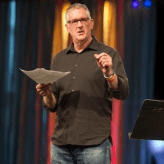

Earlier this week I met with a friend who’s recently moved into the lead pastor role at his church, after more than a decade as its youth pastor. He’s persevering through a hard transition, moving the church’s culture toward a more Jesus-centered focus. He’s trying to make Jesus the main course in their church feast, not a side dish. He’s seeding his congregational environment with the heart of Jesus, the engine of every thriving church. And it’s been an uphill climb, to say the least…
In the middle of our conversation he looked perplexed and disoriented: “I don’t understand why some people seem instantly drawn to the heart of Jesus, and some people give me a kind of blank stare when I invite them to encounter Him…” I told my friend what I’ve said to others who’ve asked me the same question: “Jesus is the most-known, least-known person in human history—when we describe His upending and disorienting and magnetic presence, we’re casting a beautiful net into an ocean of people, and the net catches only those who are captured by Him.” A light spilled into my friend’s countenance: “Yes! That’s so true… Some get caught in that net, but it seems like most do not.” Down through time, human beings have preferred lesser gods to Jesus.
G.K. Chesterton said: “If you meet the Jesus of the gospels, you must redefine what love is, or you won’t be able to stand him.” This is so deeply true that I can’t stop myself from re-quoting this in my books and referencing it in my conversations. It is hard to “stand” Jesus if you’re really paying attention to what He did and what He said. He is the most redemptively disruptive person who ever walked the earth. Philosophy professor and C.S. Lewis scholar Dr. Peter Kreeft once told a class of Boston University students: “Christ changed every human being He ever met…. If anyone claims to have met Him without being changed, he has not met Him at all. When you touch Him, you touch lightning…”
Jesus alone is worthy to be worshipped, but not because we’re “supposed to”—everything Jesus said and did fits together into a perfect mirror of the God we can’t see, but long to know. And the image of God we see in Jesus will bowl us over and transform us, if we will only pay attention. Once, I decided to quickly read through the gospel of Matthew, seeking only to let this account of Jesus’ life, death, and resurrection simply replace my misconceptions of who Jesus is and what He’s busy doing. Here are 15 observations I gleaned from that pursuit:
1. Jesus spent more time praying than speaking.
2. Jesus enjoyed spending time with self-confessed sinners.
3. Jesus said we’d know we were starting to make an impact when people started insulting, persecuting, and defaming us because of Him.
4. Jesus hated it when people hid themselves behind religious rule-keeping, and He told his followers to plunge themselves into the mainstream culture like a lamp in a dark room or salt added to a recipe.
5. Jesus spoke openly about hell and warned there are real consequences for those who cling to self-sufficiency and unbelief.
6. Jesus hated it when people prayed or served or sacrificed to boost their profiles or feed their egos.
7. Jesus was quick to forgive those who were repentant and quick to condemn those who weren’t.
8. Jesus said the richest people were those who’d banked a lifetime of actions that honored God.
9. Jesus told us to ignore people who talk big but don’t act big and to honor those who talk small but act big.
10. Jesus healed people of incurable diseases and permanent disabilities.
11. Jesus loved celebrations and enjoyed Himself so much that the religious rule-keepers accused him of public drunkenness.
12. Jesus said, metaphorically, that farmers who sat around in the farmhouse waiting for corncobs to launch themselves through the door were sadly misinformed about the concept of “harvesting.”
13. Jesus said our loyalty to Him and His ways must outweigh our loyalty to our biological family and its traditions and practices.
14. Jesus told us not to focus our energies on fighting sin (pulling weeds), but instead to do everything we can to encourage good growth (growing wheat).
15. Jesus said the root of our lack of faith is our penchant to forget the acts and character of God—our biggest faith battle is remembering to remember God.
Even in this little experiment, it’s easy to understand why we prefer lesser gods to Jesus—He is consistently offensive to our Western Christian sensibilities, “inalienable rights,” and everyday self-absorbed behaviors.
And I am passionately, inexorably, and irreversibly drawn to Him.
What about you? If you’re worshipping lesser gods today, then it’s time to slow down and pay attention to Jesus. It won’t take long before you won’t be able to stand Him, and then you won’t be able to stop worshipping Him…

Rick Lawrence is Executive Director of Vibrant Faith—he created the new curriculum Following Jesus. He’s editor of the Jesus-Centered Bibleand author of 40 books, including The Suicide Solution,The Jesus-Centered Life and Jesus-Centered Daily. He hosts the podcast Paying Ridiculous Attention to Jesus.







